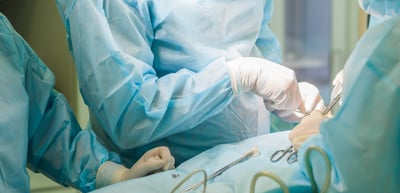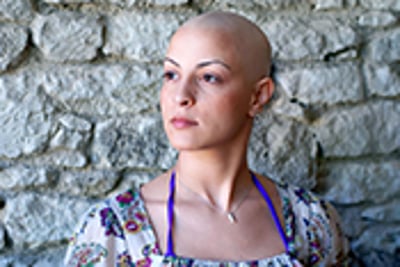FORCE's eXamining the Relevance of Articles for You (XRAY) program looks behind the headlines of cancer news to help you understand what the research means for you.
XRAY is a reliable source of hereditary cancer research-related news and information.
Learn more about the XRAY program
Categories Intimacy & Body Image
Personal Story : Juliet's story: No reconstruction is a post-mastectomy option
Most relevant for: Women who have had or are considering mastectomy without reconstruction
In a March 2018 article from breastcancercare.org, Juliet conveys her personal experience with a breast cancer diagnosis and her decision to not have her breasts reconstructed after her mastectomy. She details the emotional complexity of her thought process and the empowerment she felt in her decisions. (5/24/18)
Read More
Article : Oncoplastic breast-conserving surgery with BioZorb® technology
Most relevant for: Women undergoing lumpectomy for breast cancer
The January 22, 2018 issue of The Columbian included an interview with Dr. Anne Peled in its online report, “Breast cancer surgeon diagnosed with breast cancer advocates oncoplastic surgery.” Dr. Peled is a 37-year-old breast cancer surgeon and plastic surgeon from California who was recently diagnosed with breast cancer. She underwent oncoplastic lumpectomy—a single surgery that removes the tumor and rearranges the remaining tissue to eliminate any resulting breast deformity. Peled’s procedure included a relatively new technology that she uses for her own patients: an implanted BioZorb® marker, a small device that improves precise targeting of radiation therapy and cosmetic outcome. (2/8/18)
Read More
Relevance: Medium-High


Strength of Science: Medium-High


Research Timeline: Post Approval


Study : What is the risk of breast cancer recurrence after nipple-sparing mastectomy?
Relevance: Medium-High


Strength of Science: Medium-High


Research Timeline: Post Approval


Most relevant for: Breast cancer patients who are considering or have had a nipple sparing mastectomy
Nipple-sparing mastectomy (NSM) offers better cosmetic results for women who have immediate breast reconstruction (at the same time as their mastectomy). Over the past decade, NSM has gained popularity among surgeons and patients. Studies show that women who keep their own nipples have higher rates of satisfaction and psychological well-being after mastectomy and reconstruction compared to women who lose their nipples. However, little data exists on the long-term risk of recurrence following NSM. New research adds to a growing body of evidence suggesting that risk of recurrence is low after NSM in carefully selected patients with breast cancer. (1/25/18)
Read More
Relevance: Medium


Quality of Writing: High


Research Timeline: Human Research


Article : The buzz around MonaLisa Touch
Relevance: Medium


Quality of Writing: High


Research Timeline: Human Research


Most relevant for: Women experiencing vaginal symptoms from menopause
THIS INFORMATION HAS BEEN UPDATED. The FDA issued an alert in July, 2018 noting that laser or radiofrequency devices that have received FDA clearance are ONLY cleared for treating abnormal or pre-cancerous cervical or vaginal tissue and genital warts and have NOT been approved for vaginal rejuvenation. There are currently clinical trials enrolling women to study whether laser and radiofrequency devices can improve vaginal atrophy and other menopausal symptoms.
For many young breast cancer survivors and high-risk women, the side effects from early menopause after treatment and surgery can negatively impact their personal lives. This XRAYS looks at one of the many recent media articles on a laser procedure called MonaLisa Touch. The article, "Is Laser Treatment for Vaginal Atrophy Safe?" was published online in 2017 by FOX News and written by Dr. Manny Alvarez. XRAYS will discuss what this laser procedure actually is and how it may impact a young breast cancer patient’s life after treatment. (1/19/18)
Read More
Relevance: High


Strength of Science: Medium-High


Research Timeline: Post Approval


Study : Does scalp cooling help prevent hair loss after chemotherapy?
Relevance: High


Strength of Science: Medium-High


Research Timeline: Post Approval


Most relevant for: Patient undergoing chemotherapy
Hair loss is one of the most recognized and distressing side effects of some chemotherapies. Two studies looked at the use of scalp cooling therapy to help reduce hair loss after chemotherapy for early-stage breast cancer. (5/15/17)
Update: Based on data from clinical trials, the FDA approved Dignicap scalp cooling device for treatment in patients diagnosed with solid tumors who are receiving chemotherapy.
Read More
Article : After mastectomy: reconstruct or not?
Most relevant for: Woman who are facing mastectomy
Today, more women know they can have breast reconstruction after removing their breasts for cancer treatment or risk reduction. But what about choosing not to undergo reconstruction? Roni Caryn Rabin writes about the experiences of women who decide against reconstruction in her New York Times piece “‘Going Flat’ After Breast Cancer.” (12/14/16)
Read More
Study : Removing ovaries before age 50 may increase the risk of chronic conditions for some women
Most relevant for: Women under 50 years of age who have had or are considering removing their ovaries
Removal of ovaries and fallopian tubes prevents ovarian cancer, but it may come with other health risks. Experts recommend removal of ovaries and fallopian tubes in women at high risk for ovarian cancer due to inherited mutations in BRCA or other genes linked to ovarian cancer risk. For these high-risk women the benefit of ovarian cancer prevention outweighs the risk of long-term complications. Based on a recent study, some researchers feel that for women who are not at increased risk for cancer, the risk for some chronic conditions is too high to consider removal of both ovaries. (11/1/16)
Read More